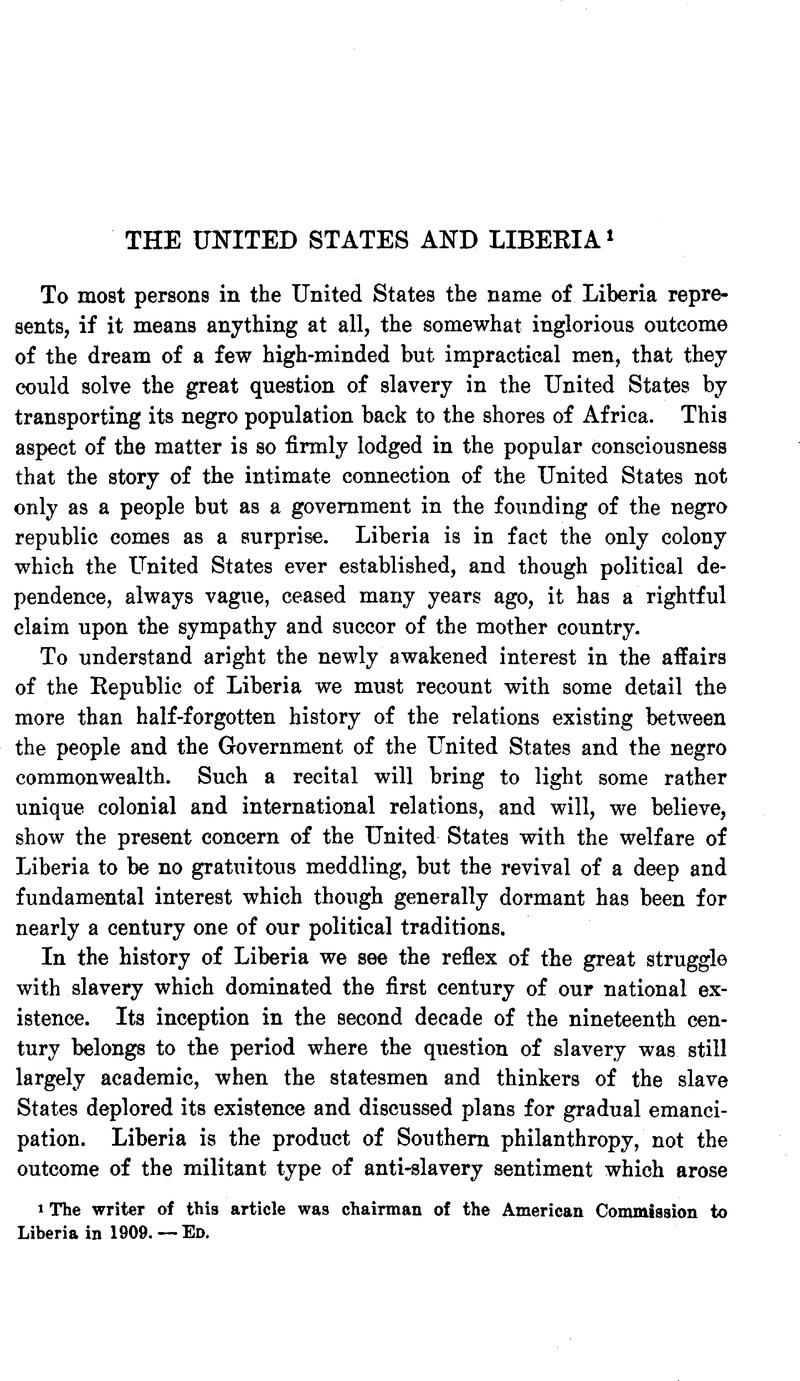Article contents
The United States and Liberia
Published online by Cambridge University Press: 04 May 2017
Abstract

- Type
- Research Article
- Information
- Copyright
- Copyright © American Society of International Law 1910
References
1 The writer of this article was chairman of the American Commission to Liberia in 1909. – ED.
2 See Ferguson, John. Memoirs of (he Life and Character of the Rev. Samuel Hopkins, D. D. Boston, 1830 Google Scholar. Hopkins’ idea was mainly that of missionary effort to Christianize Africa, to be conducted by negroes trained for that purpose in America. Out of it grew, it is said, the notion of a permanent settlement of our American blacks in Africa.
3 See McPherson, J. H. T. History of Liberia . Johns Hopkins Studies, 1891, p. 17 et seqGoogle Scholar.
4 See Act of March 3, 1819, and special message of President Monroe, stating his interpretation of it, Supplement, pp. 188 and 190.
5 In the Memorial of the Semi-Centennial Anniversary of the American Colonisation Society, Washington, 1868, we find the following statement (p. 190) of the numbers sent to Liberia.
Settled by the parent society:
Born free 4,541
Purchased their freedom 344
Emancipated to go to Liberia 5,957
“Freedmen” 753
6 See Latrobe, J. H. B. Maryland in Liberia . Baltimore, 1885 Google Scholar
7 For form of government adopted, see Supplement, p. 193.
8 An interesting account of many such affairs is given in the correspondence of Commodore Matthew G. Perry, 1843. Senate Executive Document 150, 28th Congress, 2d Session. See also Foote, Commander Andrew, H., Africa and the American Flag , New York, 1854 Google Scholar.
9 “The story of Liberia from its earliest inception to its elevation to independent statehood demonstrates its American character throughout. Its first foothold on the African coast was through the efforts of American citizens. From 1819 the association of the Government of the United States with the project is distinct. The colony was a necessary factor in the execution of a federal statute. The vessels of the United States participated in the initial act of colonization. Negotiations with the inland tribes for the purchase of lands were conducted by officers of the United States. Prior to the civil war the United States maintained a squadron on the west coast of Africa to suppress the slave trade, and the officers of this squadron lent their aid and assistance to the Liberians in their troubles with the natives. In 1886 Congress authorized the Secretary of the Navy to transfer a gunboat to Liberia, but no vessel was found available for the intended service.
“Thus the resources of the United States Government have been employed tocolonize the liberated Africans, to build homes for them, to furnish them with farming utensils, to pay instructors for them, to purchase or charter ships for their convenience, to detail naval vessels for the transport of its agents and as convoys to the colonists, to build forts for the protection of the settlers, to supply them with arms and munitions of war, to enlist troops to guard them, and to employ the army and navy in their defense. The lands which the several state colonies established were purchased with American money by the several state societies. The initial organization of the Commonwealth was perfected and controlled by the parent societies in the United States, and the eventual creation of the Republic of Liberia was due to the generous counsel and action of the American societies in advising the organization to become an independent state and in relinquishing to the new state the directory powers they had theretofore exercised.” (Report of Mr. Knox, Secretary of State, to the President, March 22, 1910. Senate Document No. 457, 61st Congress, 2d Session.)
For a similar view, see Bacon, N. J., Some Insular Questions , Yale Review, August, 1901 Google Scholar
10 See Letter of American Colonization Society, December 22, 1842, Supplement, p. 207.
11 Mr . Web9ter to Mr. Everett, March 24, 1843, Supplement, p. 211.
12 For the report in full see Supplement, p. 198.
13 Mr. Fox to Mr. Upshur, August 9, 1843, Supplement, p. 211.
14 Mr. Upshur to Mr. Fox, September 25, 1843, Supplement, 212.
15 See Johnston, Harry Sir, Liberia , Vol. 1, p. 192 Google Scholar et teg.
16 See passage from President Buchanan’s message of 1858, Supplement, p. 218.
17 Senate Executive Document 75, 31st Congress, 1st Session. The concluding part of the report is quoted in the Supplement, p. 215.
18 These expressions in chronological order are given in the Supplement, p. 220 et aeq.
19 Senate Document 457, 61st Congress, 2d Session, March 25, 1910.
- 3
- Cited by


